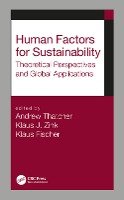This book deals with the central question of how human factors and ergonomics (HFE) might contribute to solutions for the more sustainable development of our world. The contents of the book are highly compatible with the recent political agenda for sustainable development as well as with sustainability research from other disciplines.The book aims to summarize and profile the various empirical and theoretical work arising from the field of "Human Factors and Sustainable Development" in the last decade. The book gives a systematic overview of relevant theoretical concepts, their underlying philosophies, as well as global application fields and case studies.

